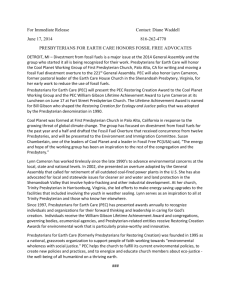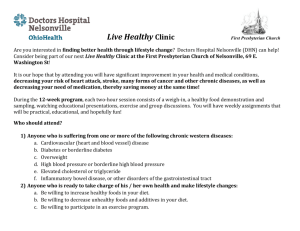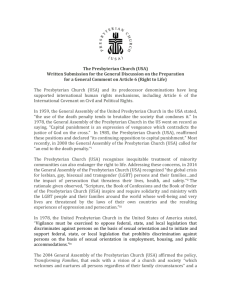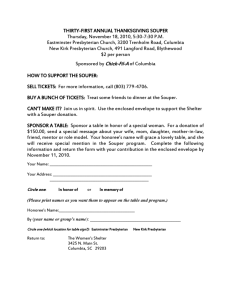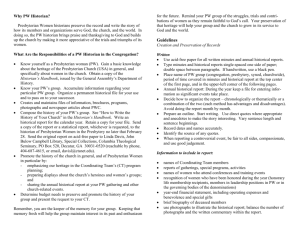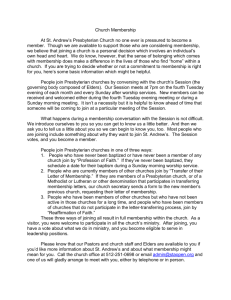August 14, 2005 - John P. Leggett
advertisement
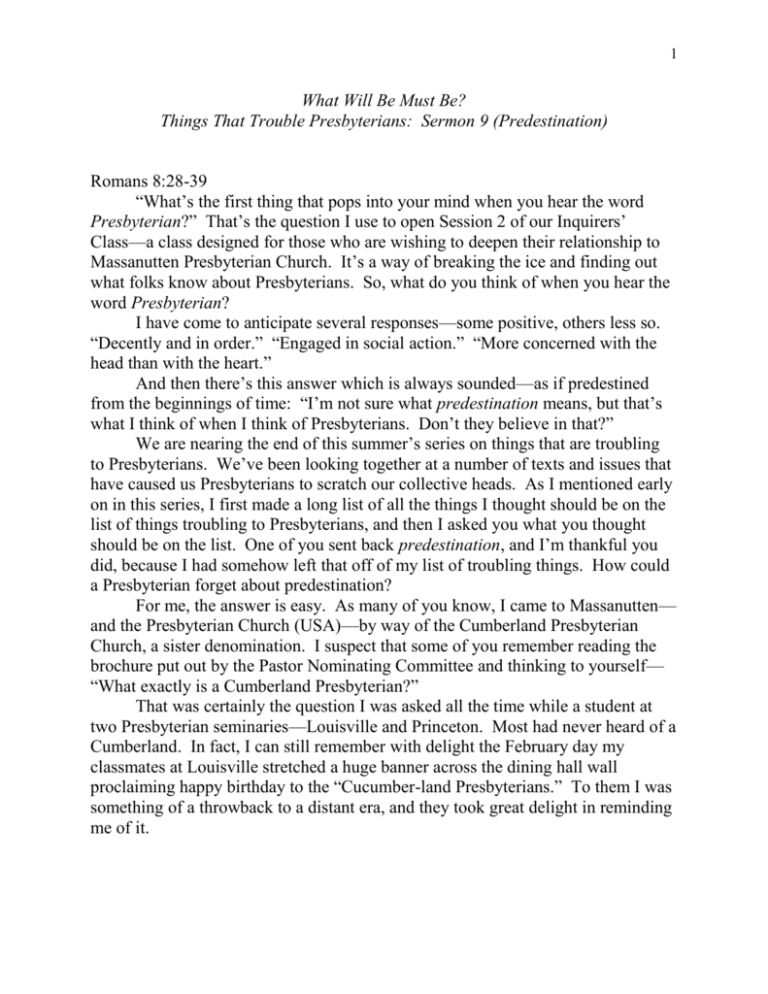
1 What Will Be Must Be? Things That Trouble Presbyterians: Sermon 9 (Predestination) Romans 8:28-39 “What’s the first thing that pops into your mind when you hear the word Presbyterian?” That’s the question I use to open Session 2 of our Inquirers’ Class—a class designed for those who are wishing to deepen their relationship to Massanutten Presbyterian Church. It’s a way of breaking the ice and finding out what folks know about Presbyterians. So, what do you think of when you hear the word Presbyterian? I have come to anticipate several responses—some positive, others less so. “Decently and in order.” “Engaged in social action.” “More concerned with the head than with the heart.” And then there’s this answer which is always sounded—as if predestined from the beginnings of time: “I’m not sure what predestination means, but that’s what I think of when I think of Presbyterians. Don’t they believe in that?” We are nearing the end of this summer’s series on things that are troubling to Presbyterians. We’ve been looking together at a number of texts and issues that have caused us Presbyterians to scratch our collective heads. As I mentioned early on in this series, I first made a long list of all the things I thought should be on the list of things troubling to Presbyterians, and then I asked you what you thought should be on the list. One of you sent back predestination, and I’m thankful you did, because I had somehow left that off of my list of troubling things. How could a Presbyterian forget about predestination? For me, the answer is easy. As many of you know, I came to Massanutten— and the Presbyterian Church (USA)—by way of the Cumberland Presbyterian Church, a sister denomination. I suspect that some of you remember reading the brochure put out by the Pastor Nominating Committee and thinking to yourself— “What exactly is a Cumberland Presbyterian?” That was certainly the question I was asked all the time while a student at two Presbyterian seminaries—Louisville and Princeton. Most had never heard of a Cumberland. In fact, I can still remember with delight the February day my classmates at Louisville stretched a huge banner across the dining hall wall proclaiming happy birthday to the “Cucumber-land Presbyterians.” To them I was something of a throwback to a distant era, and they took great delight in reminding me of it. 2 But, though many today still believe the only reason the Cumberland Presbyterian Church was formed was so that its ministers would not have to be educated, at the heart of the debate was what to do with this doctrine of predestination. In 1810, a small group of Presbyterian ministers on the frontier of Tennessee, trying to deal with the overwhelming numbers being converted in the Great Awakening, and struggling to respond to the harshness of life in the wilderness, began to question a number of things, but particularly the doctrine that said that from the beginning of time God has determined the destiny of all people—that God had predestined some to heaven and some to hell, and that people did not have any choice in the matter. The historical marker beside the birthplace shrine in Dickson County, Tennessee—where I served as chaplain one summer—described it as a doctrine of fatalism. It tells how Cumberlands were the first Presbyterian body to question the “doctrine of fatalism” of the Westminster Confession. I will never forget the day one of the Presbyterian members of my study group in Nashville returned from a visit to the state park that houses the chapel. He couldn’t believe the language— doctrine of fatalism. He said real Presbyterians preferred the more favorable description of this doctrine as “God’s loving decree.” Anyway, a couple of centuries ago there was a group of fairly hard-nosed Presbyterian types who wanted to tow that doctrinal line, as they perceived it; and there was an equally sure-minded group of more liberal Presbyterians who perceived differently, and thought that human free will had to be a part of God’s good creation. In 1810 these issues spilled over into a presbyterial battle that brought about the formation of a presbytery named Cumberland. And those Presbyterians called Cumberland are still around today (the PCUSA and the CPC will hold concurrent General Assemblies in June 2006), and I was one of them. Now, when I started to consider moving from the Cumberland Presbyterian Church to the Presbyterian Church (USA), I knew someone was going to ask about it. After all, whenever someone from a Baptist tradition moves in, they are always asked about the mode of baptism and the connectional nature of the church. I figured someone would know enough about the Cumberland Church to ask me what I thought about the doctrine of predestination. So I started rehearsing what I would say if asked, beginning with striking all references to the word fatalism. “God’s loving decree.” “God’s loving decree.” And then I polished that old standard joke, “What’s the only sure-fire pickup line at a Christian singles gathering?” “Before tonight I never believed in predestination.” I thought it might help break the ice. 3 And then I would think about the textbook answer that talks about the doctrine of predestination as describing God’s gracious initiation of the gift of salvation in Jesus Christ.1 In other words, at the heart of this doctrine is the Presbyterian insistence upon the sovereignty and freedom of God. But beneath all of those well-rehearsed answers, I kept remembering a couple of conversations I had years ago. The first was one of those late-night college conversations in which Scott and I started talking about whether or not we really had free will. In other words, has God doomed us to hell or marked us for salvation since before we are born so that we have no choice in the matter? The conversation lasted for seven hours, because I couldn’t get past what Scott kept saying: “Humans have free will. We just can’t not choose what God has chosen for us.” I have never been able to get my mind around that understanding of what it means to have a will that is free. I wonder if he was trying to find a way to talk about the human freedom to conform our wills to the will of God. The other conversation I kept hearing in my mind was one that I had with Kubota, who was a Japanese teacher at the university in China where I taught English. Kubota and I became great friends during our months together in the foreigners’ compound. We ate together three meals a day and played marathon ping pong matches most afternoons and evenings. We then struck a deal. He would teach me tai-chi and I would teach him Christian theology. Unfortunately, neither of us proved to be excellent students. My body simply never mastered the disciplined steadiness of tai-chi, even though he did his best to help me understand it. And I didn’t have much luck with theology for him. Part of it was language, but there was something deeper holding him back. It turns out Kubota had talked with some other Christians before, and they had told him that God had chosen some for salvation and others for damnation— that God would not allow some to believe, and he had placed himself in that group, because he struggled to believe the gospel that Christians proclaim. Paul was the one who forced this question upon us. “For those whom God foreknew he also predestined to be conformed to the image of his Son…and those whom he predestined he also called; and those whom he called he also justified; and those whom he justified he also glorified.” We know that Augustine interpreted this passage in the fifth century, saying that it showed the work of salvation belonged to God—that humans had nothing to do with it. “Martin Luther 1 Donald K. McKim, Presbyterian Questions, Presbyterian Answers: Exploring Christian Faith (Louisville: Geneva Press, 2003), 59. 4 took it up again almost a thousand years later and argued that all human beings were doomed to hell anyway, so if God saved some, it was evidence of God’s great mercy. Even if most remained doomed, said Luther, we should be thankful that God saw fit to save some. John Calvin came along and allowed his logic to take him to what he called a ‘terrifying decree,’ that God has destined some for salvation and some for hell from the beginning of time.2 And we’ve been kicking it around almost since Paul’s letter was sent to the church in Rome. The Cumberlands of Middle Tennessee were certainly not the first Christians to be troubled by this doctrine. Even in the early church, and especially during the period of the Reformation, the debate raged. And it still continues today. Whenever the debate flares up, then and now, it almost always centers on the question: What about the unsaved? We’re not so much concerned with who’s in, but with the people who are out. It is interesting that these are the sorts of questions we ask, when they are precisely the questions Paul and others do not ask very often or dwell on very long. Paul is interested in the church, the elect, not the unsaved. He is more than willing to let God sort through who is out and who is in. Paul is only willing to go so far in his processing of this radical mercy of God. “Believing in the sovereignty of God, which is the taproot of predestination, means that Paul will not play God, no matter what logic seems to dictate.”3 In an excellent sermon on this text, my friend Chris Joiner describes a scene that embodied the essence of what this doctrine means for our faith. He tells the story like this: “One day the former sheriff of an Alabama town went into his work space in the backyard of his home and did two things that you or I, on a normal day, might consider eccentric. He went into his shed on a bitterly cold late afternoon, looked around until he found a couple of scraps of paper, and, with only a small light bulb casting a gloomy reflection, he wrote down his wife’s name on one of them and, on the second piece of paper, this Presbyterian elder, Sunday school teacher, father, grandfather, and husband, wrote, ‘And we know that all things work together for good for those who love God, who are called according to his purpose.’ Then, he took his hammer off the wall, pulled out two rather large nails, and nailed these two pieces of paper to the wall. His wife brought copies of those two papers to me after he died. She thought she knew the exact day he had nailed them to the wall, the day she had had to go pick him up on the side of the road in Birmingham. He 2 3 Christopher A. Joiner, “If God Is for Us,” preached at First Presbyterian Church of Franklin, TN on July 24, 2005. Joiner, “If God Is for Us.” 5 had frantically called her, lost, confused, and scared. She thought it was the first day he really came to terms with his Alzheimer’s, and so he made the decision that there were two things he did not want to forget, for as long as possible: her name, and God’s faithfulness. It was an act that finally did not work. He eventually did forget the name of his wife, and he could not, even if he wanted, quote the scripture passage that he nailed to the wall. In a cruel twist, he was not even able to read. He completely forgot. His will, his thoughts, his entire being was washed away by this terrible disease. If his faith were a matter only of his own human will, then he was of all people most to be pitied. But not even Alzheimer’s can separate us from the love of God in Christ Jesus. He may have forgotten, but God did not forget.”4 It is not only those afflicted with Alzheimer’s who have difficulty remembering. In the midst of our own living, we would do well to recall that all this stuff we accomplish or accumulate by virtue of our wills will eventually cease. We will eventually cease. All will be left behind. We will, all of us, be released into the care of God. And it is good news for us to remember that God will remember us; God has called us, elected us, chosen us for a special purpose. This is not our doing. Let us live then out of gratitude for this remarkable grace, not grasping our lives to ourselves, but giving ourselves away in confidence that God’s grace and mercy are new every morning and that nothing in all creation will be able to separate us from the love of God in Christ Jesus our Lord. John P. Leggett Massanutten Presbyterian Church 50 Indian Trail Road Penn Laird, VA 22846 August 14, 2005 Twentieth Sunday in Ordinary Time (Year A) 4 Joiner, “If God Is for Us.”
